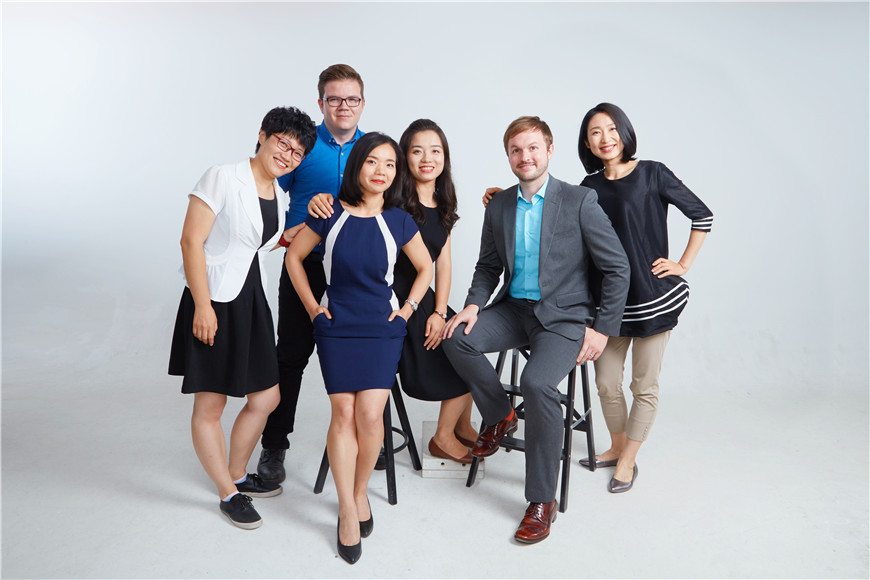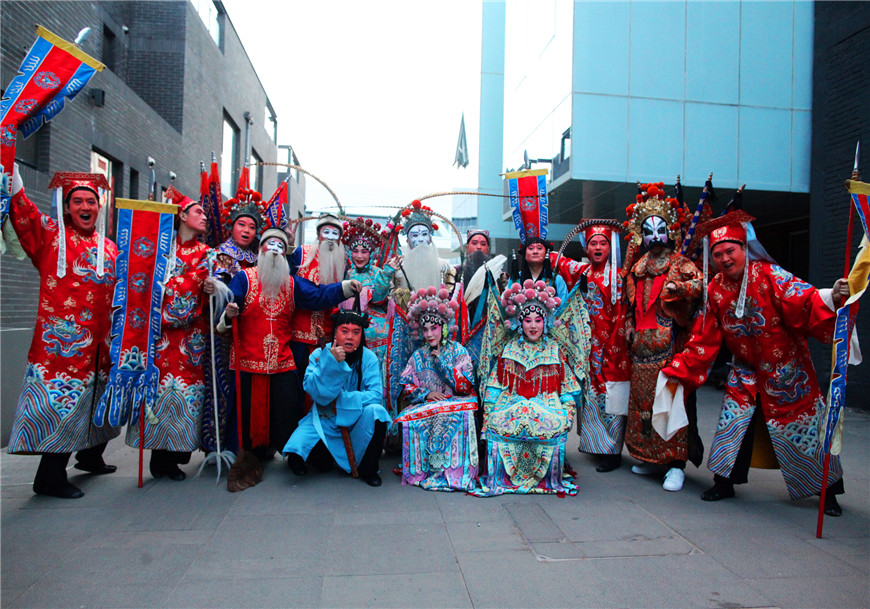Grace Lang: Nurturing Innovation between China & the UK

By Charmaine N Clarke
Grace Lang has strong views on the long-running debate about whether China is merely a copycat or an innovator. The two roles, she says, are “not necessarily mutually exclusive”. She should know. She’s China Director for UK Research and Innovation (UKRI), the United Kingdom's national funding agency for investing in – as the name suggests – research and innovation. In managing the China office, one of UKRI’s four overseas locations, Grace leads a team that, over the past 11 years, has facilitated nearly £300 million worth of joint investment to support about 70 joint research and innovation programmes involving more than 200 universities, numerous research institutions and 130 businesses in both countries.
“China is developing so rapidly and on such a complex scale that categorising it under simplified headings like ‘innovator’ or ‘copycat’ fails to capture the whole picture. Assessing innovation competence is complex,” she explains. During an interview with TheLINK, she also weighed in on the value of radical versus incremental innovation, and China’s success in utilising the latter. She believes both approaches are “important and valuable” at different stages of development. “Radical innovation brings huge impact to companies or entire industries, while incremental innovation introduces small changes to a certain service or a product. These are two strategic approaches to innovation which complement each other at different stages of sectoral development. Which option is chosen often hinges on a company or an individual’s attitude to risk taking,” she explains.
 She adds, “There are many examples showing that China is very good at incremental innovation. In certain sectors, the Chinese have in-depth technical knowledge which enables them to rapidly adapt existing technology to an emerging need within the market. A rebalancing to include radical innovation takes time and a solid knowledge base. Based on my observations over the past 15 years working in the R&D investment sector, it's fascinating to see China's transformation. And I am sure it will only become more fascinating in the years to come.”
She adds, “There are many examples showing that China is very good at incremental innovation. In certain sectors, the Chinese have in-depth technical knowledge which enables them to rapidly adapt existing technology to an emerging need within the market. A rebalancing to include radical innovation takes time and a solid knowledge base. Based on my observations over the past 15 years working in the R&D investment sector, it's fascinating to see China's transformation. And I am sure it will only become more fascinating in the years to come.”
Grace has the benefit of having a ringside seat. As UKRI’s China Director, she spends a lot of time investigating the latest research and innovation trends in China, identifying potential opportunities and sectors in which the UK and China can add value either by building on each other's respective strengths or complementing each other. “Research and innovation is a core element of UK-China relations. The UK is China's second largest partner in terms of co-authored science papers,” she explains. The team that she leads also provides insights and advice to their UK headquarters on strategic opportunities to work with China on research and innovation. They also build and develop relationships with public and private investment agencies in China, negotiate high-quality, co-funded R&I initiatives; and enhance the value of investments to achieve scientific, economic and social impact.
Grace has been with the organization since 2008, helping it evolve from the stand alone RCUK China to UKRI China, an integral part of a wider network consisting of four overseas offices and the UK HQ. She enrolled in the CEIBS EMBA in 2016, hoping to bolster her professional career with theoretical business skills. She wasn't disappointed. Read on for more about Grace’s role in fostering innovation, and China-EU ties.
TheLINK: Tell us a bit about UK Research and Innovation (UKRI) and your work there?
With an annual budget of over £6 billion, the UKRI funds research and innovation through seven Research Councils, Innovate UK and Research England. UKRI has four overseas offices: Beijing (UKRI China), Brussels (UKRO), New Delhi (UKRI India) and Washington D.C. (UKRI USA).
The UKRI China Office, which I manage, was founded in September 2007 (it was then known as RCUK China and became UKRI China from April 2018).
During my time as Deputy Director of RCUK China, we launched the first co-funded research programme with China (in 2008), a milestone in building the UK-China research and innovation partnership.
I got promoted to RCUK China Director in 2014 and then UKRI China Director in 2018, and between 2008 and 2014 we leveraged roughly around £10-15m in co-funding per year. Since 2014, that figure has doubled. We have gone beyond co-funding research and started designing business-led programmes. In 2014, we pioneered a joint programme with the Ministry of Science and Technology on sustainable manufacturing with businesses being the lead partners. Later on, Innovate UK (a constituent of UKRI) worked with regional Science & Technology Commissions and co-funded several programmes in Jiangsu, Shanghai and Guangdong, supporting R&D development in emerging high-tech industries.
Now quite a bit of my time is spent investigating the latest research and innovation trends in China, identifying potential opportunities and sectors in which the UK and China can add value either by building on each other's respective strengths or complementing each other. I also spend a huge amount of my time communicating with colleagues at home and in the other overseas offices to exchange updates on research challenges in the UK and elsewhere. This helps develop thinking on how we may join forces with public investors in different countries to tackle shared challenges. I also attend academic workshops and public engagement activities to network with researchers, innovators and entrepreneurs to understand where they see benefits, where the barriers are and what on-the-ground help we could offer to smooth collaboration.
 TheLINK: You have the word innovation in your title, a buzz word these days. How important is it for you, as an individual, to be innovative in your current role?
TheLINK: You have the word innovation in your title, a buzz word these days. How important is it for you, as an individual, to be innovative in your current role?
It's hard not to be innovative in an organization whose main role is to fund research and innovation. UKRI is a newly established organisation in the UK. The reform of bringing the Research Councils, Innovate UK and Research England all together to create one organisation, working individually and collectively, to support the R&I ecosystem is itself a truly innovative approach.
A big part of my job is to work with colleagues at home and our partner funders in different countries to develop diversified funding mechanisms to respond to the fast changing R&D landscape and the needs of emerging R&D communities. If you look at our investment portfolio, we have covered quite a wide range of sectors over the past decade (energy, agriculture and food security, ageing and health, creative industries, manufacturing, environment). Our funding mechanisms also vary, from supporting networks and mobility grants to substantive R&D programmes, joint R&D centres and hubs, partner institutions and industry-specific accelerators. Designing tailor-made funding mechanisms to meet the specific needs of different sectors and those of different academic fields and businesses involves considerable innovative thinking.
The most difficult aspect of my job is managing a wide range of internal and external stakeholders to balance and achieve organisational goals. This includes developing a trusting relationship and forging partnerships with public R&D investment organisations in different countries and facilitating knowledge exchange between academia and industry in a large variety of sectors to better integrate research and innovation.
Addressing these challenges requires establishing trust, which is at the core of the leadership courses we took during the CEIBS EMBA. Trust is gained through understanding the real needs of different groups of stakeholders. Learning to view and appreciate things from other people’s perspectives helps identify common ground and identify solutions suitable to all. To bring government policymakers, academics and businesses together, one needs to understand the languages used by these different groups. Facilitating cross border partnership in emerging high tech sectors demands a grounding in subjects like macroeconomics, supply chain management and mergers and acquisition. In-class sharing and debates made my experience very enjoyable and thought-provoking.
TheLINK: You mentioned how the CEIBS EMBA has helped you overcome challenges now being faced on the job. Why did you initially enrol, what goals were you trying to achieve, and were they met?
When I enrolled in the CEIBS EMBA in 2016, my goals were to widen my horizon by learning ‘business thinking’ and developing my network in the private sector. I have achieved this and more, gaining insights into different sectors through interactions with my classmates and the alumni network. Most importantly, I found the right group of people who share similar values and lifestyles. CEIBS connects us wherever we are and the supporting network that we build through the EMBA programme will take us a long way.
 TheLINK: What was the most useful lesson learned during your CEIBS EMBA?
TheLINK: What was the most useful lesson learned during your CEIBS EMBA?
Developing positive thinking and sharing it with others by showing what's possible. A line from National Geographic’s Dewitt Jones, shared with us by Professor Andre Wierdsma, was particularly inspiring: ‘By celebrating what's right with the world, we find the energy to fix what's wrong’. Positivity is crucial in taking your work from excellent to outstanding.
Also, sitting in CEIBS EMBA classes where we almost always had both foreign and Chinese professors on the same course was a big benefit to me. I found it extremely helpful having the opportunity to appreciate the same issue from different perspectives. And I chose two elective courses taught in English only, which provided valuable opportunities to engage with Global EMBA classmates. It was such an amazing experience to see how classmates with different cultural backgrounds interact and approach business issues. One thing that I really liked about CEIBS is that one has access to both the local as well as global network.
If the KPIs are based on business knowledge gap filled before and after CEIBS, making greater strategic contribution to the organisation I am working for, I am definitely a top student! If the KPIs are setting up your own business, improving valuations of your business, or getting your business listed on NASDAQ, I am nowhere near the head of the class. But some of my classmates achieved all of these things and I’m so proud of them!
The two-year CEIBS EMBA was an enjoyable experience. It was great fun (even though there were stressful moments preparing end-of-course exams). Whenever I watch the video of my class’ stage performances of Peking operas and musicals, traversing the Gobi Desert, dressing up in costumes for New Year celebrations, I can’t help smiling. I know that my two years with CEIBS was a fantastic investment. It was a time of pushing boundaries and enriching life experience, as simple as that.
TheLINK: Can you give us three tips on how professionals such as yourself, or from the wider business world, can enhance Sino-UK or Sino-EU ties?
Keep an open mind and be willing to learn, appreciate and be flexible.
Develop a diverse team and build a support network across sectors.
Competition makes us faster but collaboration makes us better.
International collaboration and partnerships is crucial when the world is getting smaller and we are all connected in one way or the other. Creating a shared understanding to achieve mutual benefits but allowing differences is essential. It is the diversity that makes the world a rich and interesting place to live.















